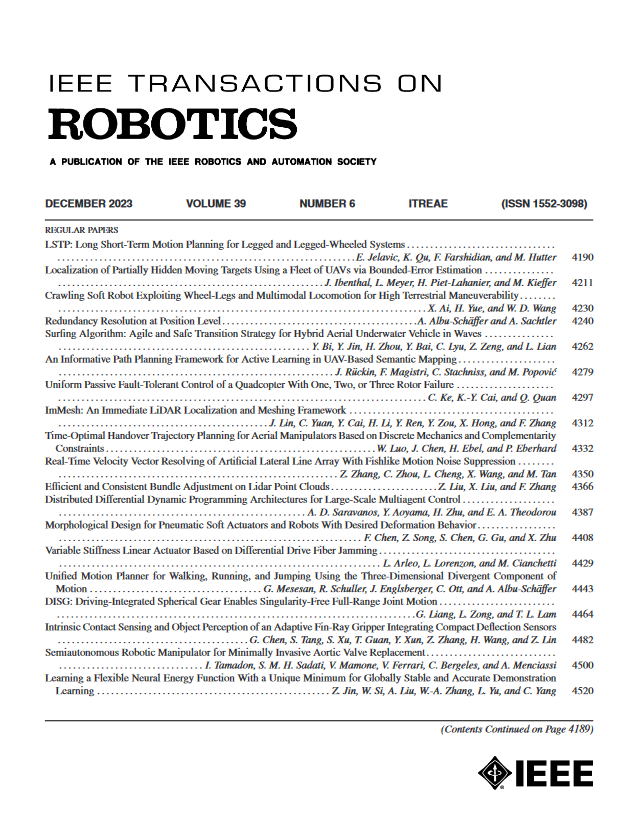对机器人决策支持的信任和依赖
IF 9.4
1区 计算机科学
Q1 ROBOTICS
引用次数: 0
摘要
本文研究了人们对机器人决策支持系统(DSS)的信任和依赖,该系统通过建议提供认知帮助。机器人决策支持系统可能并不总能提供最佳建议,这就要求人们谨慎依赖,以最大限度地提高绩效。我们分析了用户在解决数学和纸牌游戏的即时和连续决策任务时对次优机器人的依赖。在瞬时任务中,我们发现用户感知到的拟人化程度 $(p < . 001$)和决策支持失败后机器人的行为 ($p < . 001$)会显著影响用户的信任度。在一项连续任务中,人机团队的有效性要在数次决策后才会显现,我们发现,在机器人显示其建议之前引入用户发起的决策建议可减轻过度依赖($p < . 05$),而用户的任务专业知识对于确定是否适当依赖机器人的建议至关重要($p < . 01$)。综合来看,这些研究具有协同作用,是首次联合研究各种因素对用户信任和依赖的影响,为设计机器人DSS提供指导,以最大限度地提高人机任务性能。本文章由计算机程序翻译,如有差异,请以英文原文为准。
Trust and Dependence on Robotic Decision Support
This article investigates people's trust and dependence on robotic decision support systems (DSSs), which provide cognitive assistance through suggestions. Robotic DSSs may not always offer optimal suggestions, requiring people to rely carefully to maximize performance. We analyze user reliance on suboptimal robots for solving instantaneous and sequential decision-making tasks with a math and card game, respectively. In instantaneous tasks, we find that the users' perceived anthropomorphism
$(p < . 001$ $p < . 001$ $p < . 05$ $p < . 01$
求助全文
通过发布文献求助,成功后即可免费获取论文全文。
去求助
来源期刊

IEEE Transactions on Robotics
工程技术-机器人学
CiteScore
14.90
自引率
5.10%
发文量
259
审稿时长
6.0 months
期刊介绍:
The IEEE Transactions on Robotics (T-RO) is dedicated to publishing fundamental papers covering all facets of robotics, drawing on interdisciplinary approaches from computer science, control systems, electrical engineering, mathematics, mechanical engineering, and beyond. From industrial applications to service and personal assistants, surgical operations to space, underwater, and remote exploration, robots and intelligent machines play pivotal roles across various domains, including entertainment, safety, search and rescue, military applications, agriculture, and intelligent vehicles.
Special emphasis is placed on intelligent machines and systems designed for unstructured environments, where a significant portion of the environment remains unknown and beyond direct sensing or control.
 求助内容:
求助内容: 应助结果提醒方式:
应助结果提醒方式:


